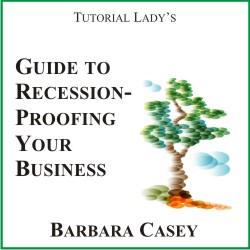Did you know… the word “niche” comes from the French verb nicher “to nest?”
My name is Barbara Casey AKA “The Tutorial Lady.” I’m a firm believer in creating a credible, useful niche for your home-based business… and this page is my “soapbox” where I explain in some detail why I feel so strongly about niche marketing for home businesses.
Years ago, I read two books that really influenced my thinking on how home business owners could best make a splash in the business world. One book was called Focus by Al Ries and the other was Positioning by Al Ries and Jack Trout.
After digesting their concepts, I followed up by reading many more books and articles on the subject of niche marketing… and how to create a powerful niche that you could stand behind and become well known for. As for myself, I made modest strides with my “tutorial lady” niche and even have three Kindle e-tutorials to show for it. Right now, I’m refocusing my writing in other directions, but will still make the effort to figure out where my new niche lies.
I hope you glean a few ideas while you’re here.
Why don’t more business owners niche?
Webster’s Collegiate Dictionary defines a niche as “a place, employment or activity for which a person is best fitted.” A business niche, then, is a commercial means of livelihood involving work that you are completely suited for, that you feel “at home” doing. Finding the right niche allows you to “live your real life” doing work you love.
(1) Creating a niche requires you to narrow your business focus
Unless you’re by nature a highly focused person, you’ve probably looked into a number of different ways to earn a living as an independent business owner. You can see the possibilities in quite a few of these business opportunities and hesitate to give up the chance of making extra income. But… what do you call yourself on your business card?
A niche helps you simplify your business.
(2) Some people think a niche might be boring
Limiting your business to one thing doesn’t sound too exciting. You have varied interests, talents and skills and you want to engage in them, but having a business niche sounds like you’ll be doing the same thing day in and day out. That’s why creating the right niche is important.
Your ideal niche will make use of your skills and talents in an occupation for which you have a passion.
(3) A niche requires tough choices
Committing yourself to becoming known for one thing means letting other business go. You may have sidelines you’ve been nurturing or paying clients who fall outside your niche. You might even have to change your business name so it stands for the “one thing” you’ve chosen to become known for.
What does your business stand for?
What makes a niche work?
You want to become well-known for your niche… as famous as Amos and his cookies or as identifiable as Doreen Virtue and angel messages. But this takes thought and action. For example:
- You need to be clear about your business purpose.
- You need to create a focus for your business that tells prospects what you stand for. This involves deciding what to eliminate and what to keep from your current business operation.
- You need to pinpoint, or target, your clientele.
- You need a business name describing your focus.
- You need to communicate your uniqueness to prospects and clients in a way that sticks in their minds.
6 Ways a Niche Can Boost Your Business Income
- A niche builds confidence.
Niches are often based on your area of expertise. If your area of expertise is also the work you love to do, you’ve probably spent a lot of time and money in educating yourself and in perfecting your skills. Building a business around a subject you’ve mastered gives you more confidence when taking your message to the marketplace. “Sideline” businesses don’t have the same impact, because they are not where your strengths lie. - A niche makes you credible to prospects.
People are more likely to trust the work of a small business specialist than a small business generalist. Prospects looking to purchase a product or service don’t want “okay.” They want the best they can afford. Achieving mastery in a specific area gives depth and focus to your business. If you’re a one-person operation, breadth just isn’t believable. - A niche helps you become known more quickly.
If you direct your marketing efforts repeatedly to the same group of people, you will become known more quickly. If you communicate a clear business focus to this same group, they are more likely to remember you when they have a need for your product or service. - A niche reduces your marketing costs.
When you “target” your marketing to a specific group, you no longer have to worry about marketing to the “universe” through generalized ads. Tailoring your marketing to people who already have a need for your product or service means you won’t waste money on marginal prospects. Your cost per lead is reduced. - A niche can increase your income.
People are happy to pay specialists more than they pay generalists. If you are known as an expert in your field, you can command higher fees. You will be worth these higher fees if you can solve a client’s problem more efficiently, quickly or conveniently than someone with less mastery. - A niche turns competitors into referral sources.
Once you decide to specialize in a specific area, you eliminate a number of competitors. If your competitors don’t provide the same service you do, they are more likely to refer clients who can best be served by your area of expertise. You can return the favor for those needing services outside your niche.






